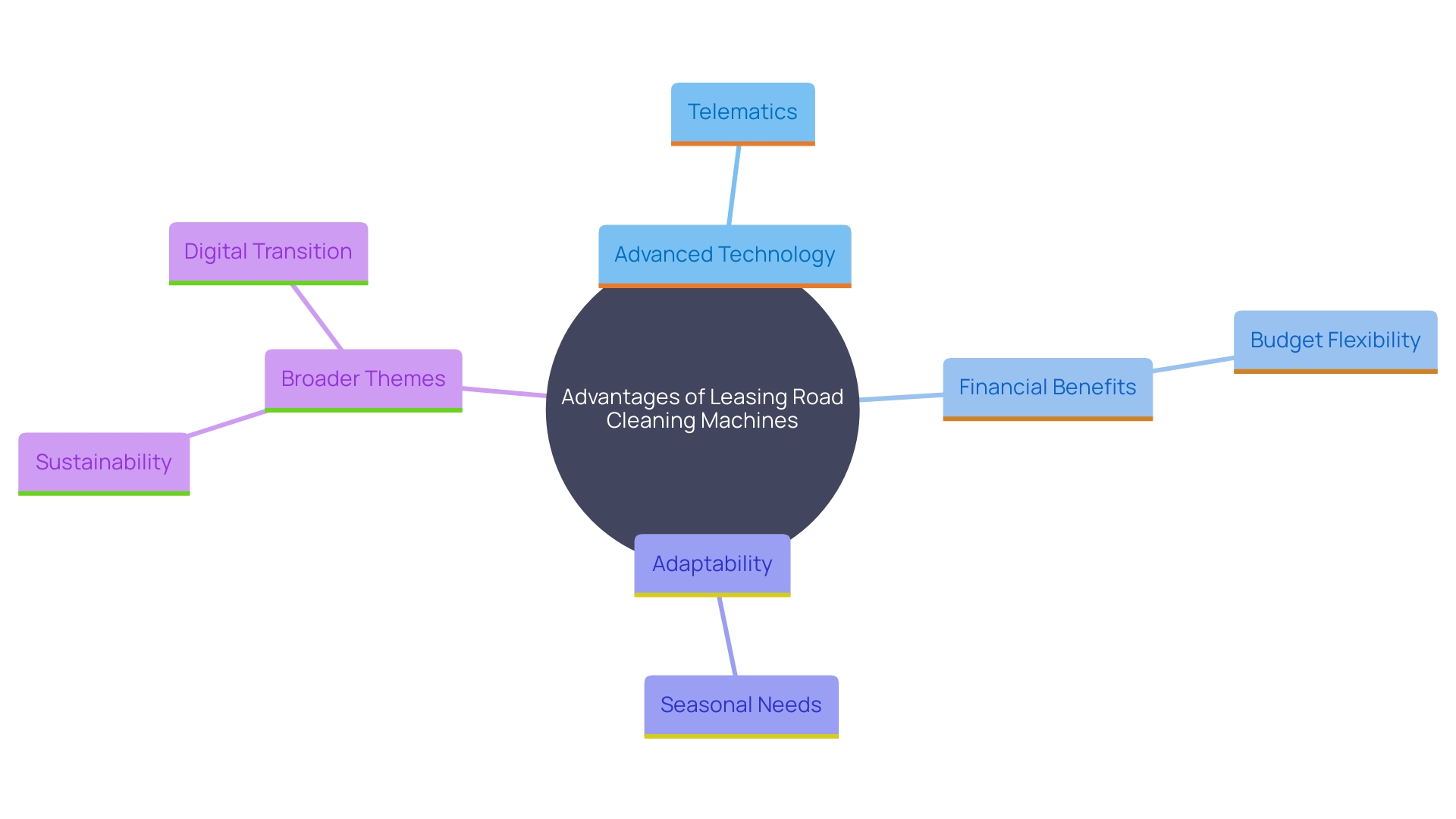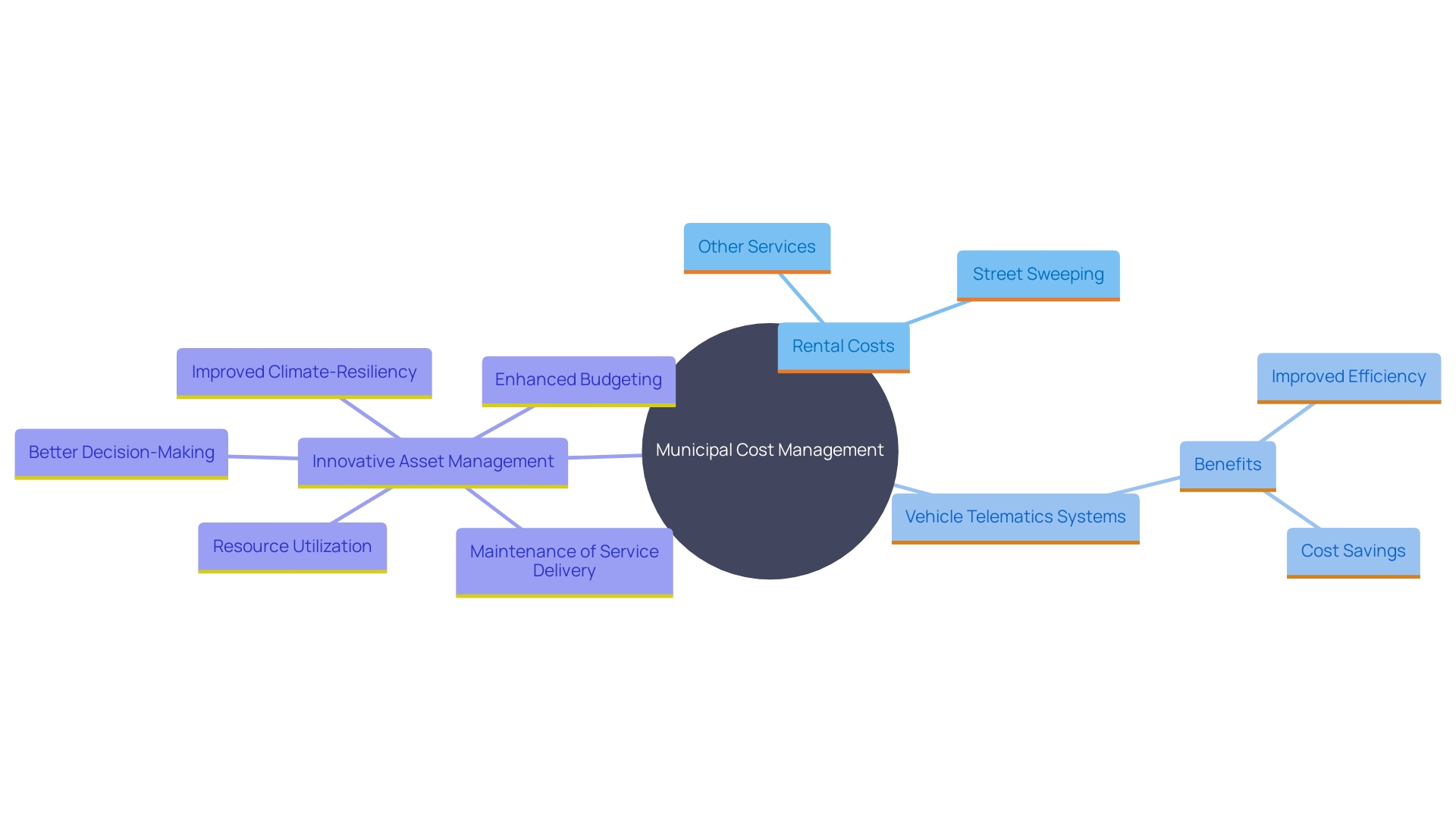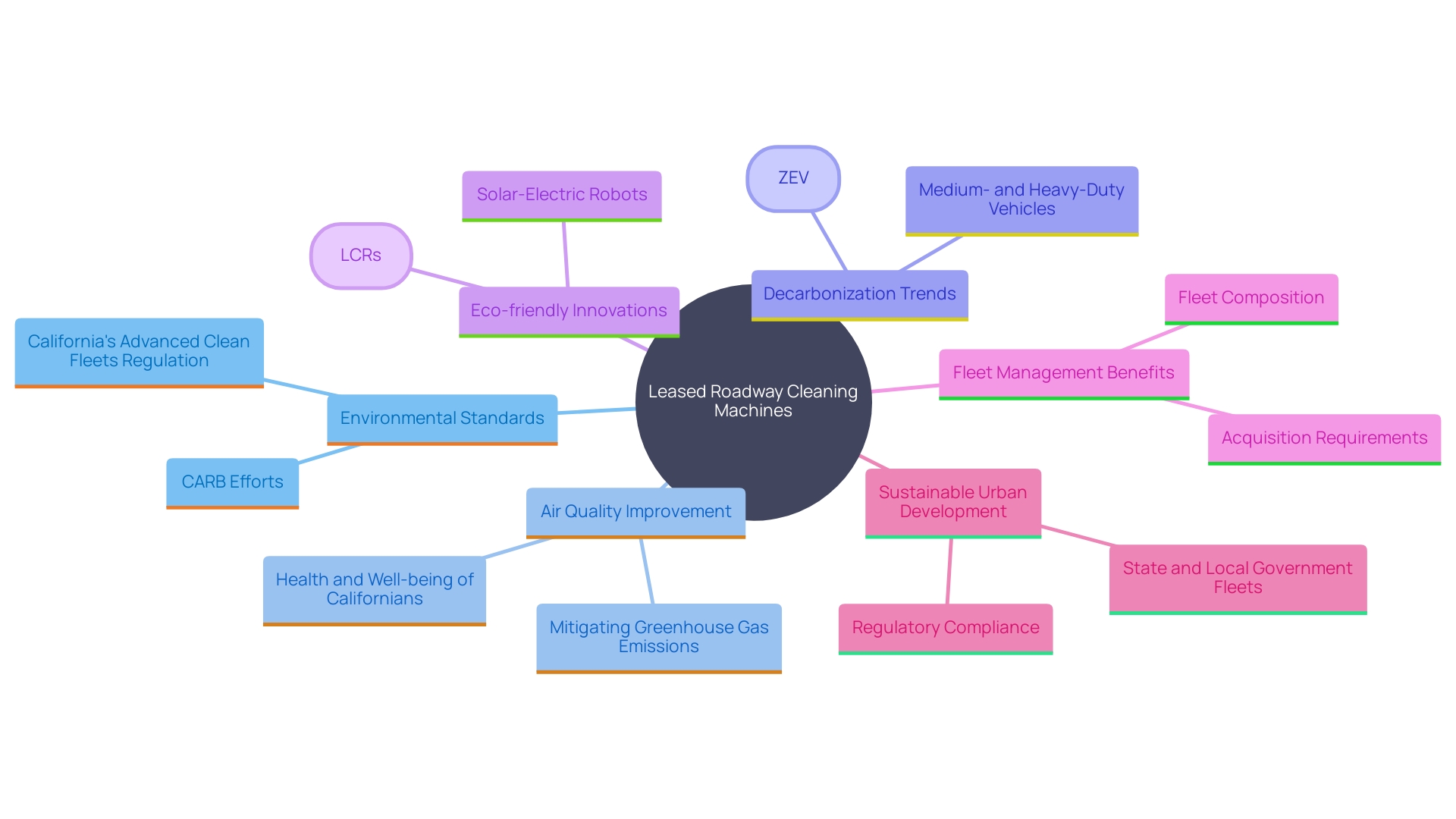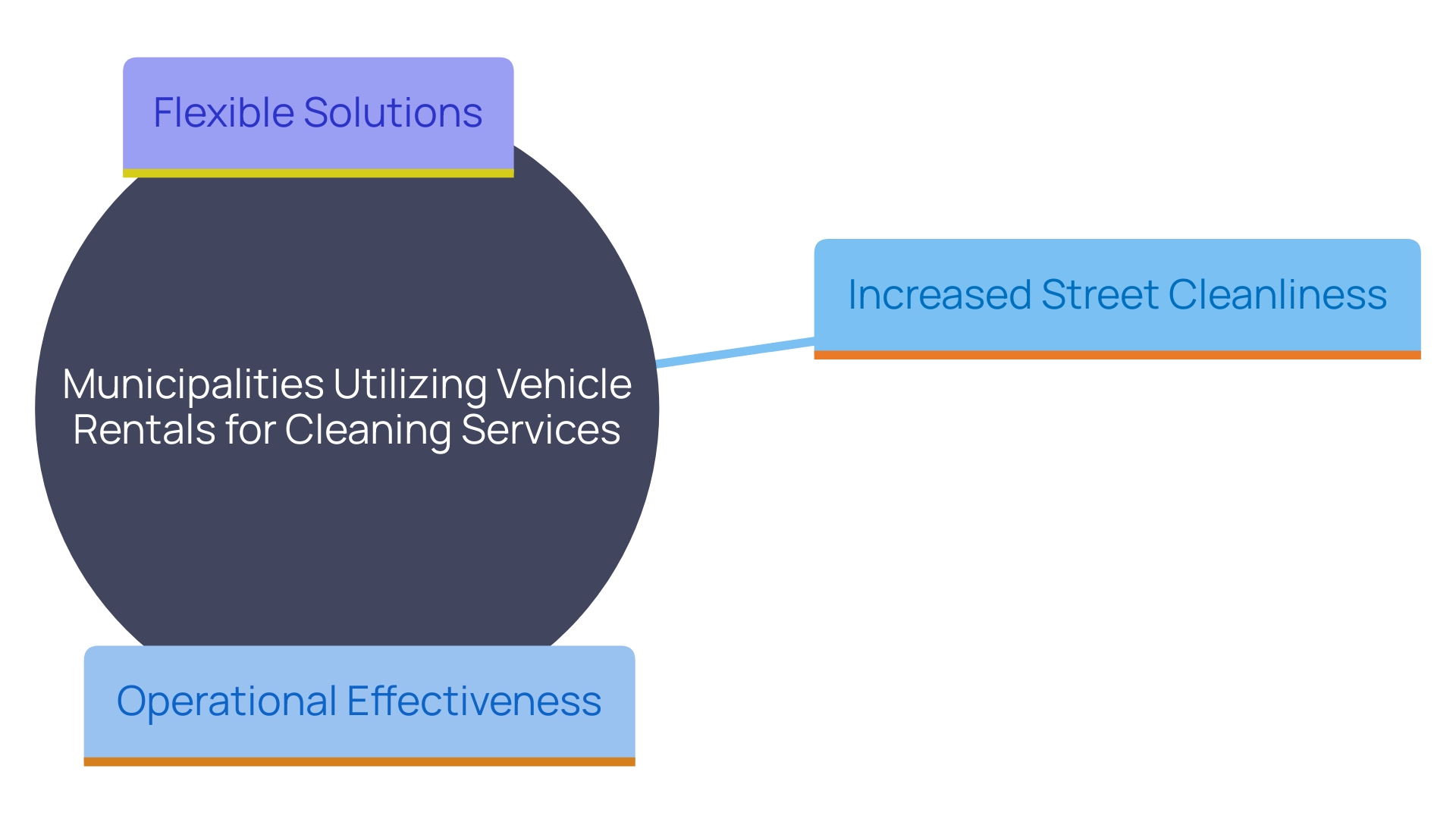Introduction
Municipalities continuously seek innovative solutions to maintain clean and sustainable urban environments. One such approach gaining traction is the rental of street sweepers. This strategy offers immediate access to the latest models equipped with advanced technologies, such as vehicle telematics, that ensure effective and compliant street cleaning.
By opting for rentals, cities can avoid the substantial financial burden of purchasing equipment, allowing for greater budget flexibility and resource allocation. Furthermore, renting allows for seasonal fleet adjustments, accommodating varying demands throughout the year, and supports the exploration of innovative, sustainable cleaning solutions without significant upfront investments. This article delves into the myriad benefits of renting street sweepers, including cost considerations, flexibility, maintenance support, and environmental impacts, supported by real-world case studies showcasing successful implementations.
Benefits of Renting Street Sweepers
Leasing road cleaning machines provides local governments prompt access to the newest models fitted with sophisticated equipment such as vehicle telematics, which comprises sensors, GPS, and video cameras. This intelligent urban technology allows efficient cleaning while guaranteeing adherence to environmental standards. By choosing rentals, municipalities can keep thoroughfares tidy without the enduring financial strain of acquiring equipment, thus enabling increased budget flexibility and the capacity to direct resources to other essential sectors. Additionally, renting provides the advantage of seasonal fleet adjustments, accommodating varying needs throughout the year. For instance, SDOT's six-month trial of an electric compact cleaning vehicle emphasizes how municipalities can investigate creative and sustainable cleaning options without a substantial initial expenditure. This approach not only meets the immediate operational needs but also aligns with broader goals of digital transition and climate resilience.

Cost Considerations for Street Sweeper Rentals
When assessing the cost of renting street sweepers, municipalities must consider the overall expenses, including rental fees, fuel, and maintenance costs. Renting eliminates the need for large capital expenditures associated with purchasing equipment, which can be particularly beneficial for budget-constrained municipalities. Moreover, many rental agreements include maintenance and support, reducing the total cost of ownership.
Cities are increasingly investing in vehicle telematics systems, including sensors, GPS, and video cameras, to track, monitor, and better manage their fleets of vehicles and drivers. This merging of intelligent urban systems, combining Internet of Things (IoT) devices, communications networks, and software, provides an effective solution for managing municipal resources.
Additionally, municipalities are finding innovative ways to manage their assets. For instance, Kitchener Council sanctioned the extension of a program to redirect end-of-life cycle laptop and desktop equipment assets, permitting them to be repurposed to aid local community groups. This approach to asset management not only maximizes resource utilization but also supports community needs.
Ken Dulaney, vice president of research at Aragon Research, emphasizes the dual benefits of such strategies: 'It’s an offensive and a defensive solution. It certainly has paid off, both in monetary terms and in terms of public relations.'
Integrating these technologies and approaches can assist municipalities in managing their budgets more efficiently, ensuring that vital services such as road cleaning are preserved without jeopardizing financial stability.

Flexibility and Scalability with Rentals
Leasing pavement cleaning vehicles enables municipalities to modify their operations to fulfill particular requirements with exceptional adaptability. For instance, the City of Melfort, known for its vibrant community and extensive public facilities, can easily expand its fleet during peak seasons or special events without the financial burden of permanent investments. This adaptability ensures that even in quieter periods, municipalities can reduce their fleet size, optimizing resource allocation and minimizing unnecessary expenses. Such an approach not only saves costs but also enhances operational efficiency, making it a practical solution for dynamic urban environments.
Maintenance and Support for Rented Street Sweepers
Leasing road cleaning vehicles provides the considerable benefit of included upkeep and assistance services. Rental companies typically provide comprehensive maintenance plans, ensuring the equipment remains in optimal condition. This service not only extends the machinery's lifespan but also significantly reduces downtime, allowing municipalities to maintain clean roadways efficiently without the hassle of managing repairs and servicing. For example, utilizing a remote asynchronous analysis system, road cleaners can now communicate their cleaning status in real-time, further reducing any potential disruptions. This approach ensures continuous operation, which is crucial for maintaining public health and commercial appeal in urban areas.
Environmental Impact and Efficiency
Employing leased roadway cleaning machines can greatly enhance a municipality's sustainability initiatives. Modern street sweepers are engineered to meet rigorous environmental standards, effectively improving air quality by reducing dust and debris. Renting these machines enables cities to utilize the latest eco-friendly innovations, ensuring a cleaner and healthier urban environment. For instance, the rise of decarbonization and the growing focus on air quality management are key sustainability trends in 2023, showcasing the importance of adopting green technologies. The benefits of fleet management, such as increased productivity and cost savings, are now accessible to municipalities of all sizes. This approach aligns with the broader movement towards sustainable urban development, addressing the urgent need for effective environmental solutions.

Case Studies and Successful Implementations
Municipalities adopting vehicle rentals for cleaning are experiencing notable enhancements in urban tidiness and operational effectiveness. In one specific instance, a mid-sized municipality that chose to rent street sweepers during peak seasons experienced a remarkable 30% increase in street cleanliness ratings from residents. Such examples underscore the potential of strategic equipment rentals to enhance urban maintenance programs, reflecting a broader trend where cities leverage flexible solutions to meet growing and diverse community needs effectively.

Conclusion
Renting street sweepers presents municipalities with a practical solution for maintaining clean and sustainable urban environments. This strategy allows immediate access to advanced equipment without the financial burden of purchasing, enabling cities to adapt their fleets to seasonal demands and explore innovative cleaning technologies.
Cost considerations highlight the advantages of rentals, as they eliminate large capital expenditures and include maintenance services that reduce total ownership costs. This financial flexibility allows municipalities to allocate resources more effectively and invest in essential services.
The flexibility and scalability of rental agreements enable cities to optimize operations by adjusting fleet sizes as needed, minimizing unnecessary expenses and enhancing efficiency. Comprehensive maintenance support ensures continuous operation, reducing downtime and disruptions.
Furthermore, the environmental benefits of rented street sweepers are significant. Modern, eco-friendly technologies improve air quality and contribute to sustainability initiatives. Case studies show that cities utilizing this approach experience marked improvements in urban cleanliness, demonstrating the effectiveness of flexible solutions in meeting community needs.
In conclusion, renting street sweepers effectively addresses the challenges faced by municipalities. It fosters cleaner, healthier urban environments while ensuring financial and operational sustainability, aligning immediate needs with long-term goals of responsible urban management and environmental stewardship.




